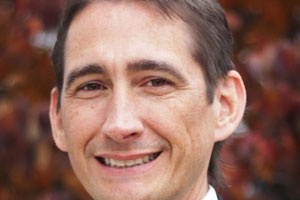Name: Michael P. Rieker, DNP, CRNA , FAAN
Class Year: DNP ’03; MSN ’94
Current location and institution:
Director, Nurse Anesthesia Program
Wake Forest School of Medicine
As recipient of the 2016 Program Director of the Year Award, what accomplishment are you most proud of?
I am most proud of having implemented a vision that educates students to appreciate a wider role and responsibility in the world. I want our students to recognize their leadership potential and to be equipped with value-added experiences and skills to make them more marketable. To that end, I implemented a program of global health education. Starting with one student in 2006, now 80 percent of the most recent class spent time in another country to learn about anesthesia delivery, population health and interprofessional care. Students are also highly encouraged to become involved in professional advocacy, such as to lead change in their profession. As a result, we have had three national student representatives hail from Wake Forest in the past five years.
I also implemented a service learning project, which gives students the opportunity to gain experience in business, education, public relations or other arenas outside of clinical anesthesia care. These are just three examples of deliberate experiences the program provides to help students recognize that they have wider opportunities and a broader contribution to make in the world, beyond taking care of patients in the operating room every day.
Why did you choose to enter the nursing profession and become a CRNA?
As a child, I was always interested in health care. I had medicine on the mind when I became a hospital volunteer at age 13. I developed the impression that physicians spent a lot of time talking about their patients, while the nurses spent more time talking to their patients. I did not have anesthesia nursing on my mind until I was an ICU nurse. One day I had an impromptu opportunity to accompany my patient to surgery, where I was absolutely fascinated with the magic of anesthesia. To see the patient go to sleep, have a horrendous surgery performed and then wake up on a dime as though nothing had happened captured an intense curiosity and desire in me to learn how to do that.
Describe your Rush experience.
My Rush experience was great. I loved being part of an excellent medical center, learning from really outstanding CRNA and physician faculty. I received a quality education, which has served me well and put me on a path to great success in leadership. I also made lifelong friends there and enjoyed the opportunity to live in Chicago.
How did your Rush education prepare you for your nursing career?
I can only say that the proof is in the pudding. I have enjoyed an awesome career as a nurse anesthetist. I have worked in every setting, from large complex medical centers to small, single CRNA hospitals and clinics, and those settings spanned every corner of the country, including Alaska, Hawaii, Texas, North Carolina and even the Virgin Islands. I have been a teacher, a department manager and the program director of a top-10-ranked nurse anesthesia program.
With the great honor of being named the AANA program director of the year, I am reminded that my education at Rush provided me the ability to handle a wide variety of settings, and it set me on a path to a very successful career.
What work are you currently involved in?
My latest venture is to establish a new degree at Wake Forest—a clinical doctorate in nursing. The doctoral program I attended at Rush had a curriculum that was unique among similar programs, and I hope to institute something with a similar uniqueness at Wake Forest.
What makes you most proud about your affiliation to Rush?
The quality and reputation of the institution. I love when people ask me where I went to school because Rush is associated so strongly with a very long tradition of medical and nursing education.
Why do you think it’s important for alumni to stay connected to Rush?
I have established and maintained many great personal and professional relationships at Rush, and mentors at Rush have helped me through many career stages. In fact when I decided to build on my master’s degree, it was not a difficult decision to return to Rush for my doctorate. I was glad that Dr. Michael Kremer, who had been my clinical instructor in the CRNA program, served as my doctoral project advisor in the DNP program.

